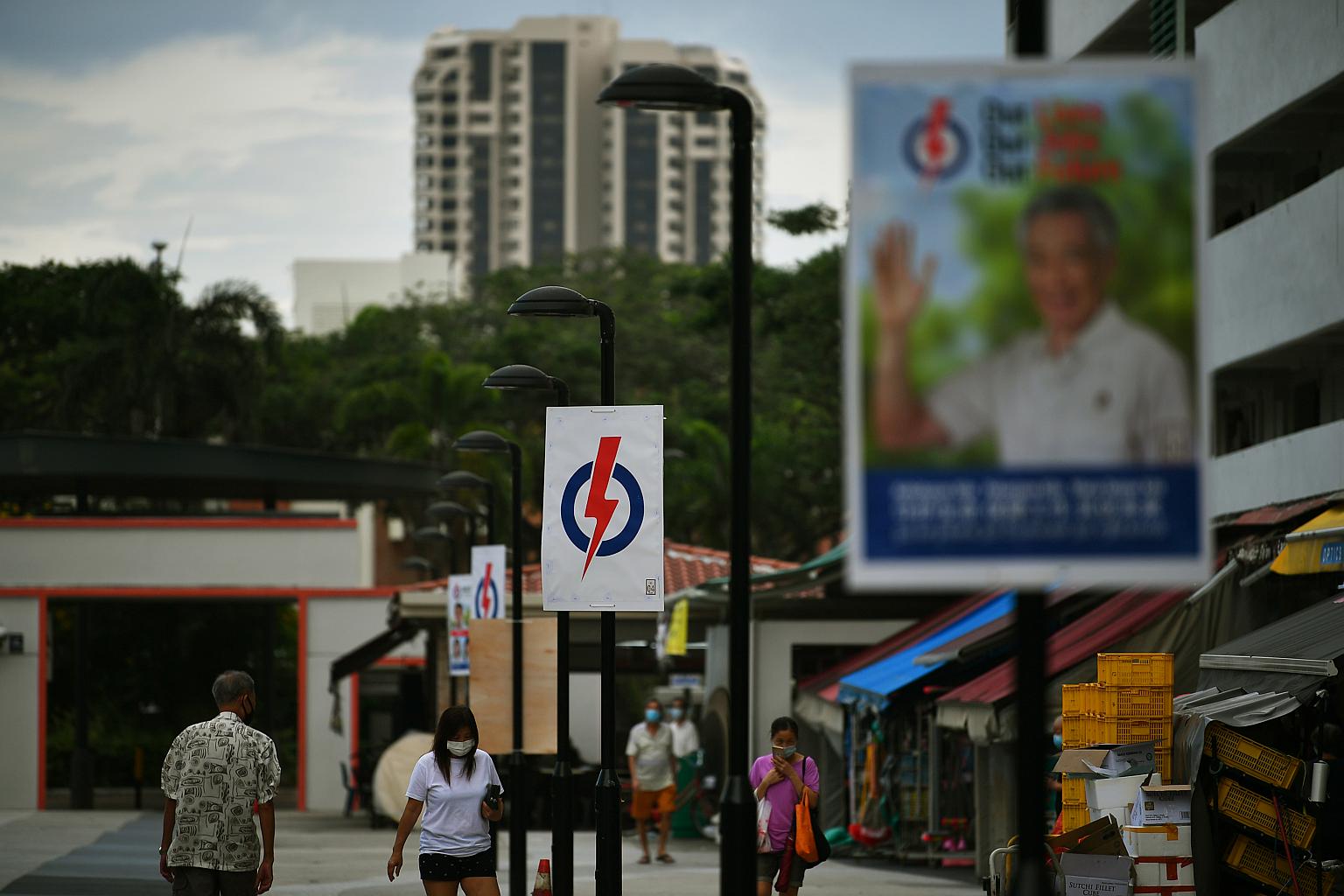IPS post-GE2020 survey: PAP still seen as most credible party but has lost ground from 2015
Sign up now: Get ST's newsletters delivered to your inbox

The PAP is still viewed as the most credible political party in Singapore, but its credibility dropped across all age groups, according to an IPS survey.
ST PHOTO: LIM YAOHUI
SINGAPORE -The People's Action Party (PAP) continues to be viewed as the most credible political party in Singapore, but its credibility across all age groups dropped in the general election held this year compared with GE2015.
Conversely, the Workers' Party (WP) gained ground across the board, with bigger increases among seniors aged 65 and older, and those aged 30 to 34.
A post-election survey by the Institute of Policy Studies (IPS) also found that overall, the credibility ratings of all six political parties ranked in the survey mirrored the number of votes they pulled in at the July 10 election.
After the PAP, the WP was found to be most credible, followed, in declining order, by Progress Singapore Party (PSP), Singapore Democratic Party (SDP), National Solidarity Party (NSP) and Peoples Voice.
The PAP won 83 of the 93 seats and garnered 61.24 per cent of the popular vote in GE2020, down from 69.9 per cent five years ago.
The survey, whose results were discussed at an online post-GE forum on Thursday (Oct 1), had asked 4,027 voters to indicate whether each of the six top-performing political parties in GE2020 was credible, based on a five-point scale from "strongly disagree" to "strongly agree".
A similar survey was also conducted after GE2006, GE2011 and GE2015.
In the latest survey, the PAP's credibility suffered the steepest drop among those aged 40 to 49. The proportion in this group, who agreed or strongly agreed that the PAP is credible, plunged 13 percentage points compared with five years ago.
National University of Singapore sociologist Tan Ern Ser, a member of the survey's research team, said the group is the "sandwiched" generation that has to grapple with the responsibilities of supporting the elderly and younger generations, and who may also face income or job insecurity.
Such bread-and-butter concerns may explain its dwindling support for the PAP at the recent election, he said.
"They are the ones in danger of losing their jobs (in the pandemic)... and that may have impacted the way or influenced the way they voted in this election."
A bigger proportion of those in the 25 to 34 age bracket saw the WP as credible compared with the proportion for the PAP. This was also true for Malay voters.
For those aged 25 to 29, about 86 per cent said the WP was credible while the corresponding figure for the PAP is around 81 per cent.
Similarly, for voters in the 30 to 34 age group, almost 88 per cent said WP was credible. The corresponding figure for the PAP is about 85 per cent.
Among all four ethnic categories (Chinese, Indian, Malay, Others), Malay respondents were the least likely to find the PAP credible, but most likely to find the WP credible.
About 82 per cent of Malays found the PAP credible compared with 87 per cent for WP.
The PAP's credibility rating also dived among voters living in one- to three-room HDB flats and those whose monthly household income is below $5,000.
On the other hand, the WP's credibility rose on both ends of the socio-economic spectrum: More voters in one- to three-room HDB flats, those with non-tertiary post-secondary qualifications as well as professionals, managers, executives and technicians (PMETs) rated the WP as credible.
"These findings reinforce the sense that the issue of livelihoods, especially for the low- to middle-income households, influenced support for the PAP and WP," said the research team.
The SDP's average credibility score rose significantly from 2.3 in 2006 to 3.2 in 2020, out of a total score of five.
Meanwhile, the PAP maintained its score of 4.1 from 2006, while that of the WP rose from 3.6 to 3.9 in that time span.
The same comparison could not be made for the NSP, which contested the 2006 election as part of the Singapore Democratic Alliance and its then figures are not available. The PSP and Peoples Voice are new parties.
There were distinct differences when it comes to the question of which parties were more likely to be seen as credible by specific demographic groups, and this may provide a hint on who these groups would vote for if they desired political diversity, said IPS deputy director of research Gillian Koh.
Those aged 21 to 39 were more likely to find the WP, PSP and SDP credible. For the NSP, voters that are more inclined to find it credible are those aged between 21 and 29.
"So if (younger voters) wanted to express their support for political pluralism, they would go to the WP, PSP, SDP and NSP," she said.
PMETs were also more likely to find the WP, PSP and SDP credible, but the same cannot be said for the NSP and Peoples Voice, added Dr Koh.


